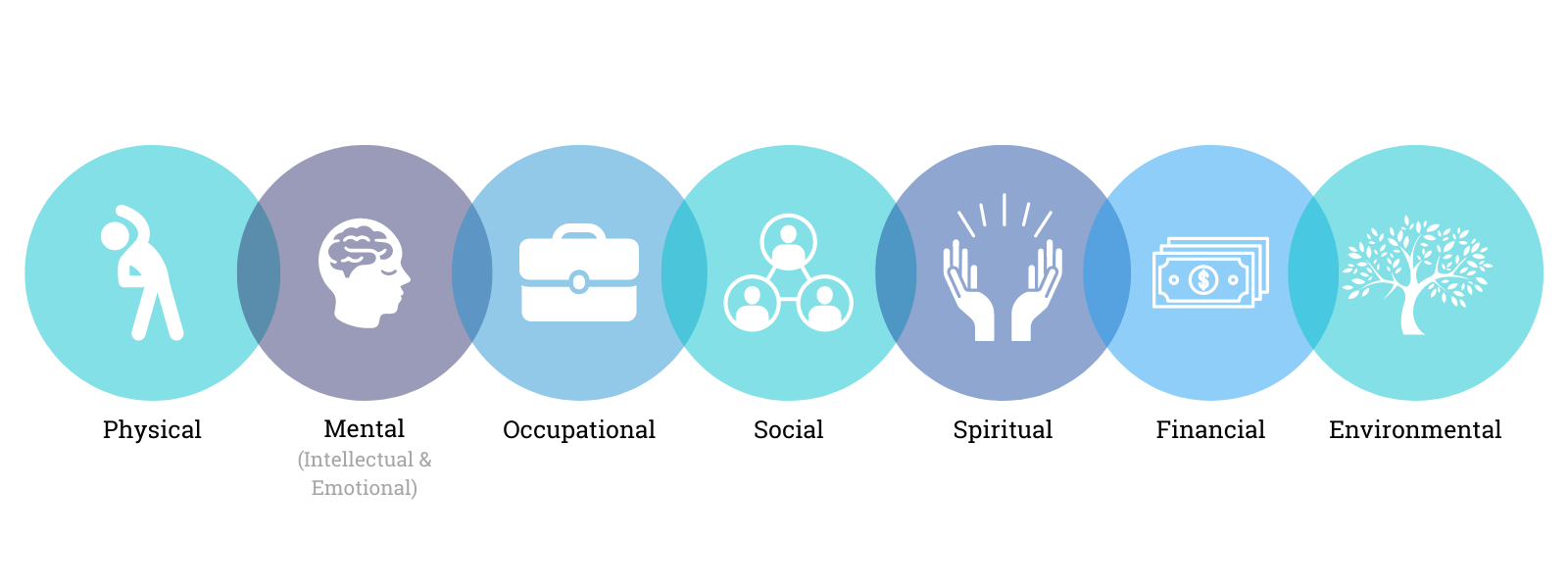What is Wellness?
“Wellness is not merely the absence of disease or infirmity. It is not a passive or static state but rather a dynamic and conscious development of the whole self.”
What is wellness?
Wellness refers to a holistic state of overall well-being that encompasses various dimensions of a person’s life. It’s more than just the absence of illness; it involves actively striving for physical, mental, emotional, and social health. Wellness takes into consideration different aspects of a person’s life and encourages them to achieve a balanced and fulfilling existence.
There are several dimensions commonly associated with wellness. Typically, these are termed the seven pillars of wellness.
“Wellness is associated with intentions, choices, and actions leading toward an optimal state of well-being so that instead of surviving, you’re thriving.”
The concept of the “Seven Pillars of Wellness” is a framework that encompasses various dimensions of well-being. These pillars provide a holistic approach to achieving overall health and wellness. While different sources may slightly vary in their categorization, the following are commonly recognized as the seven pillars of wellness:
Physical Wellness:
This pillar focuses on taking care of your body through proper nutrition, regular exercise, adequate sleep, and avoiding harmful habits. It’s about maintaining your physical health and vitality.
Emotional Wellness:
Emotional wellness involves understanding, managing, and expressing your emotions in a healthy way. It includes practicing self-awareness, coping with stress, and cultivating a positive emotional state.
Social Wellness:
Social wellness emphasizes the importance of building and maintaining positive relationships with others. It involves effective communication, developing a support network, and nurturing a sense of belonging.
Intellectual Wellness:
Intellectual wellness centres on stimulating your mind and engaging in lifelong learning. It includes seeking out new experiences, expanding your knowledge, and embracing challenges that encourage personal growth.
Occupational Wellness:
Occupational wellness relates to finding satisfaction and fulfilment in your work or chosen activities. It involves pursuing a career that aligns with your values and interests, while also achieving a healthy work-life balance.
Environmental Wellness:
Environmental wellness focuses on your relationship with the world around you. It includes making sustainable choices, promoting environmental responsibility, and creating a harmonious connection with your surroundings.
Spiritual Wellness:
Spiritual wellness involves exploring and finding meaning in your life. This doesn’t necessarily relate to religious beliefs, but rather to your sense of purpose, values, and connection to something greater than yourself.
These seven pillars represent interconnected aspects of wellness that collectively contribute to a person’s overall well-being. By addressing each of these dimensions, individuals can strive for a more balanced and fulfilling life. It’s important to note that wellness is a personal journey, and individuals may place varying degrees of emphasis on each pillar depending on their unique circumstances and preferences.
“If you see someone without a smile, give them one of yours.” – Dolly Parton
The 7 Pillars of Wellness…

What is the difference between “well-being” and “wellness”?
The terms “wellness” and “well-being” are often used interchangeably, and their meanings can overlap. Typically, wellness as a phrase seems to have become much more common but what does it mean and where does your actual well-being fit into this? Surely well-being and wellness are the same thing, to be honest, I thought so but there are subtle differences in their connotations and usage:
“The ability to be in the present moment is a major component of mental wellness.” – Abraham Maslow
Wellness
Wellness typically refers to a holistic approach to health, encompassing various dimensions of an individual’s life. It goes beyond the absence of illness and includes physical, mental, emotional, social, and even spiritual well-being. Furthermore, wellness is possibly linked to more of an act of doing. Wellness implies an active and conscious effort to make choices and adopt behaviours that contribute to a healthier and more balanced life. It involves proactive steps toward prevention, self-care, and personal development.
“If you have good thoughts, they will shine out of your face like sunbeams, and you will always look lovely!” – Roald Dahl
Well-being
Well-being has a broader and more general connotation, encompassing the overall quality of life. It includes not only health-related factors but also factors like happiness, life satisfaction, and a sense of fulfilment. Well-being is often considered a subjective experience, reflecting how individuals feel about their lives and the extent to which they experience positive emotions and life satisfaction. While well-being includes aspects of health and wellness, it may also extend to factors like a person’s environment, social relationships, financial stability, and other elements that contribute to a good life.
“For everyone, wellbeing is a journey. The secret is committing to that journey and taking those first steps with hope and belief in yourself.” – Deepak Chopra
In summary, wellness tends to focus more on the active pursuit of a balanced and healthy lifestyle, often with an emphasis on preventive measures and conscious choices. Well-being, on the other hand, is a broader concept, a philosophy if you will, that encompasses overall life satisfaction and happiness, considering a range of factors that contribute to a fulfilling existence. While the terms are related, the nuances in their meanings reflect the multidimensional nature of health and happiness.
I think the Vietnamese monk Thich Nhat Hanh sums up what it really means to be well, in order to be truly you, you owe it to the universe to be healthy. Humans should live in synergy with the world around them, taking just enough, giving back the right amount, looking after yourself and the planet that we call home.
“Keeping your body healthy is an expression of gratitude to the whole cosmos – the trees, the clouds, everything.” – Thich Nhat Hanh

